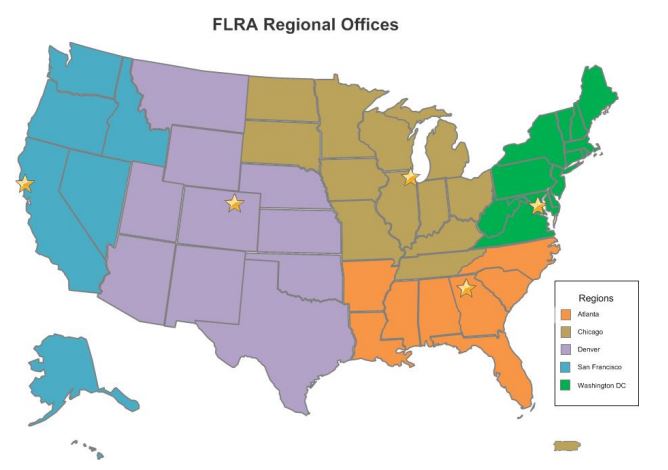

The Federal Labor Relations Authority said it reviewed case load, staffing and rental costs before finalizing its decision its second regional office in two months.
The Federal Labor Relations Authority is closing its second regional office in as many months.
The agency said it considered “regional caseloads, operating costs, rental costs and staffing” before finalizing its decision to close its Boston regional office.
As of Nov. 16, parties should stop filing unfair labor practices, charges and other cases to the Boston office. Cases arising in Connecticut, Delaware, Maine, Massachusetts, New Hampshire, New Jersey, New York, Pennsylvania, Rhode Island and Vermont should go to the Washington, D.C. office in the future.
The Chicago regional office will handle cases that originate in Puerto Rico, FLRA said. The agency will transfer any pending cases to the Washington office.
FLRA has been planning to close the Boston and Dallas offices for about a year. Plans to close the two offices were detailed in the agency’s strategic plan and 2019 budget justification and cited the president’s government reorganization initiatives.
The agency closed the Dallas regional office back in September and said it made similar considerations in making its decision to shutter the branch.

FLRA declined to comment on the impact the office closures would have on agency employees or if further plans to close more regional offices were in the works.
The agency in its budget justification downplayed the impact that closing these two regional offices would have on the agency’s ability to meet its mission and respond to constituents’ cases. But eight former directors said otherwise in a March letter to House and Senate oversight committees.
Closing two of the agency’s seven regional offices would not only undo progress the federal sector has made with employee unions in recent years but also move the FLRA closer to an “undesirable teleservice center approach to collective bargaining,” the former directors said.
In justifying its decision, FLRA said both the Boston and Dallas offices both historically took in the lowest number of cases over the agency’s other five locations.
Closing these offices would directly affect 16 employees, nine in Boston and seven in Dallas, according to the FLRA’s budget justification. The agency in total would eliminate five positions, and it would offer all impacted employees a reassignment to another regional office or to headquarters.
FLRA will also offer Voluntary Early Retirement Authority (VERA) incentives, and the Office of Personnel Management has already approved them. Employees who accept VERA should retire by Sept. 30, 2018, which is the same day that it plans to close the Boston and Dallas regional offices, the justification said.
“Vacancies that arise from VERA may create additional slots for Boston and Dallas employees to land,” the agency said. “Because the agency is not attempting to reduce employees from its rolls through this reorganization, it has determined that Voluntary Separation Incentive Payment (VSIP) authority is not appropriate, and it will not be requesting that authority.”
Though 16 employees may not sound like a significant impact, FLRA is small to begin with, and it had about 100 employees in fiscal 2017, the former directors said.
But what may have the biggest impact on federal employees and unions is the agency’s lack of general counsel.
Without a general counsel at FLRA, unions’ unfair labor practice charges have been mostly pending.
FLRA told the American Federation of Government Employees, for example, that it found enough evidence to show the Education Department bargained in bad faith and violated federal labor law. But FLRA’s word doesn’t carry much weight, because the agency’s can’t issue a written decision on an unfair labor practice charge without a general counsel.
Though former FLRA directors cited progress with federal unions, much of the momentum has faded since President Donald Trump signed three executive orders attempting to limit collective bargaining and official time. Tensions have been high since June, when federal unions sued the Trump administration over the EOs and a federal district court ruled largely in labor’s favor.
The administration has since appealed the court’s ruling.
The president’s reorganization initiatives have also prompted office closures and relocations at other agencies.
The Agriculture Department is moving forward with plans to relocate the Economic Research Service (ERS) and National Institute of Food and Agriculture (NIFA). Thirty-five states and 136 different groups expressed interest in hosting new locations for the USDA bureaus. The agency planned to make a decision by January.
USDA’s inspector general is reviewing the agency’s proposal to relocate ERS and NIFA out of the national capital region, House Minority Whip Steny Hoyer (D-Md.) and Del. Eleanor Holmes Norton (D-D.C.) said Thursday.
The Social Security Administration closed two regional offices in Baltimore, Maryland, and Arlington, Virginia early this summer, though shuttering SSA field offices isn’t unique to the Trump administration. SSA has closed more than 70 field offices since 2010, according to the agency’s inspector general.
Copyright © 2025 Federal News Network. All rights reserved. This website is not intended for users located within the European Economic Area.
Nicole Ogrysko is a reporter for Federal News Network focusing on the federal workforce and federal pay and benefits.
Follow @nogryskoWFED


